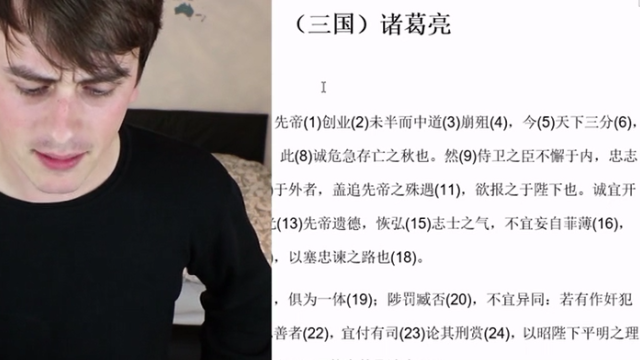【英国流行文化】A Guide to Accents 不同的英国口音
来源:英国总领事馆文化教育处
2011-03-05 08:00
Read 文本阅读
Language is never fixed. It changes over time as people try to express themselves in different ways to different people. And English, although broadly the same language, is spoken in lots of different ways by lots of different people. Normally this is because people live far apart. However, even in Britain, a relatively small place, there are huge variations in the way people speak English. And that is not to forget the large numbers of people who speak other languages as their first language – people who have migrated to Britain from abroad, as well as the significant 25% of Welsh speakers who still speak Welsh in their local communities.
语言从来都不是一成不变的。语言就是在不同的人用各自不同的方式表达自己时不断变化着。就拿英语来说,尽管一般来说一种语言,但不同国家的人说的英语也各不相同,这是因为这些人居住的地方相去甚远。即使是在英国这个相对较小的国家,人们所说的英语也有相当大的差异呢,再加上有相当一部分移民到英国的人的母语不是英语,还有25%的威尔士人依然将当地的威尔士语。
Written English is much more fixed, and changes much less quickly, than spoken English. People across Britain speak English using not only different accents, but different expressions. For example, people of different ages and from different parts of Britain may greet you with as many different words as; dear, love, darling, chuck, mate, guv, son, sir, madam, miss, fella, and many, many more. As people migrate into Britain, and as people move around Britain more freely, accents change more quickly. However, most British people can guess where another British person is from because of their accent.
而书面英语则较口语更为固定,变化也更慢。英国各地说英语不止口音上有差别,连习惯用语也存在差异。例如,不同年龄、不同籍贯的人所使用的称呼也多种多样,dear, love, darling, chuck(古语,同love), mate, guv, son, sir, madam, miss, fella等等等等。
One of the most obvious differences in accents in Britain is shown by the pronunciation of the word ‘bath’. Broadly speaking people in the north pronounce the ‘a’ as if they were saying ‘at’, and people in the south pronounce it as if they were saying ‘are’. The same distinction is true of lots of words which have a similar sound – like ‘laugh’, ‘ask’ and ‘dance’. There are other vowels that are pronounced differently in the north and south – including the vowel sounds in ‘cup’, ‘rose’, and ‘bird’. These differences are harder to explain than the ‘bath’ example. However, although different accents may sound difficult at first, they shouldn’t be too hard to understand once you get used to them!
英国人说英语时最明显的口音差别之一可以在念“bath”这个单词上表现出来,一般北方人会按发“at”时发“a”的音,南方人发的音就像是发“are”时的音。同样的区别在其他许多类似发音单词上都有,比如“laugh”,“ask”和”dance“。南北方发音区别在其他元音上也有,包括发”cup“,”rose“和”bird“这三个单词中的元音。你很难解释为什么会有这样的差别。尽管一开始你很难听懂不同地方的口音,一旦习惯了也就没那么困难了。
The same can’t be said for different areas which use completely different words. For example, the ‘Cockney’ speech, which describes a small area of east London, is nearly impossible to understand for anyone else. This is not because of the accent, but because they often use rhymes to describe things instead of the words themselves. This originally started in the 19th Century as an attempt to make sure that the police could not understand what they were saying if they were doing something criminal, though it is not the same now!
但当各地使用迥然各异的单词时可就不好说了。举个例子,the Cockney speech(伦敦腔)一词指的是伦敦市东部一块很小的地方的英语,几乎很少有这一地区外的人听的懂。这倒并不是由于他们的口音,而是因为他们惯于使用韵词来取代表示事物的单词本身来描述事物。这一现象起源于19世纪,当时人们用这一方法确保他们之间讨论欲实施犯罪时不被警察听懂,但是现在可不是为了这个。
I’ll leave you with a few fun examples of Cockney:
‘Adam and Eve’ (meaning: believe) - E.g. ‘I don’t Adam and Eve it’, means ‘I don’t believe it’.
‘Bacon and Eggs’ (meaning: legs) - E.g. ‘Move your bacon and eggs’, means ‘move your legs’.
‘Pork pies’ (meaning: lies) – E.g. ‘He’s telling pork pies’, means ‘he’s telling lies’.
节目最后,我给大家举个“伦敦腔”有趣的例子:
”Adam and Eve”亚当和夏娃(意思是:相信)例如:“I don’t Adam and Eve it”意思是我不相信。
“Bacon and Eggs’”(意思是:两条腿) 例如: ‘Move your bacon and eggs’, 意思是拿开你的腿。
“Pork pies”(意思是:谎言) 例如:‘He’s telling pork pies’, 意思是他在撒谎。
”Adam and Eve”亚当和夏娃(意思是:相信)例如:“I don’t Adam and Eve it”意思是我不相信。
“Bacon and Eggs’”(意思是:两条腿) 例如: ‘Move your bacon and eggs’, 意思是拿开你的腿。
“Pork pies”(意思是:谎言) 例如:‘He’s telling pork pies’, 意思是他在撒谎。
Glossary 生词表
migrate (v.) - to travel to another place or country to live
chuck (n.) - (Northern, informal) a friendly way of addressing a person
guv (n.) - (informal) 'guv' is used to address a man
fella (n.) - (informal) 'fella' is used to address a man
distinction (n.) - difference
cockney (n.) - a type of informal English used in East London











